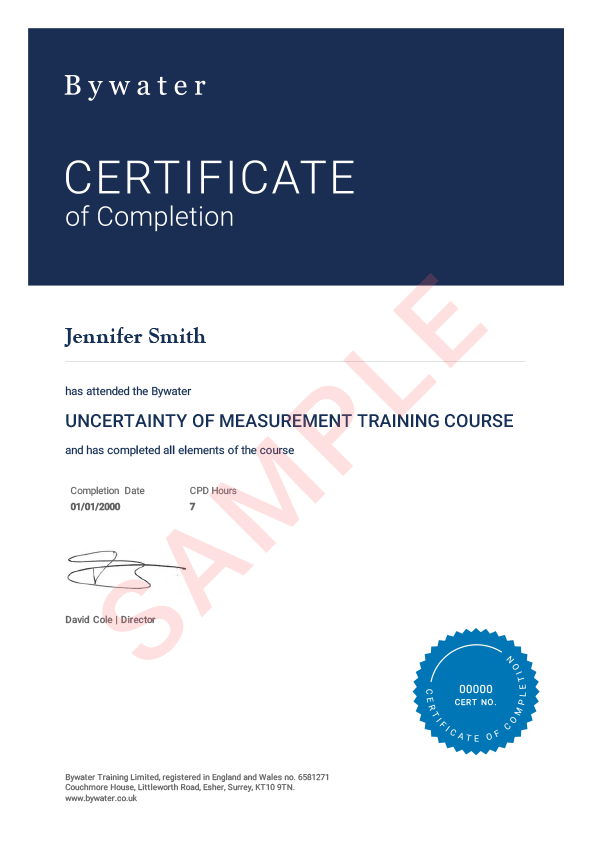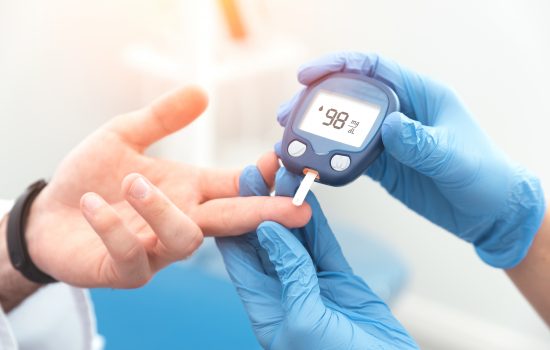Measurement Uncertainty Training Course
DURATION
1 dayCPD
Equivalent to 7 hoursCERTIFICATES
All delegates will receive a certificate on completion.DELIVERY OPTIONS
This 1-day practical course provides examples of typical uncertainty budgets, across different fields of measurement. The interactive workshops cover topics such as ‘reporting of uncertainties’, ‘traceability, accuracy, linearity, stability and uncertainty’ and ‘quantifying uncertainty components’.
By the end of the course delegates will have the knowledge to develop uncertainty budgets to meet the requirements of ISO/IEC 17025 and laboratory accreditation bodies.
- quality and design engineers
- laboratory and technical personnel
- assessors of laboratory/quality management systems
- assessors of calibration and testing laboratories
- quality and technical managers
Students attending this course will benefit more if they have a basic knowledge of maths and statistical techniques, although this is not essential. Participants should bring a laptop computer or calculator which has basic statistical functions.
- the importance of uncertainty of measurement
- basic concepts: traceability, uncertainty and terminology
- impact of uncertainty on results and compliance with specifications
- errors, effects and corrections
- Type A uncertainties and selection of statistical tools
- Type B uncertainties, identification and use
- combined uncertainties
- expanded uncertainties and confidence intervals
- reporting of uncertainties
- sources of uncertainty in different calibration fields
- worked examples
- attribute studies
- sources of further information
- apply the methodologies for calculating uncertainty budgets using practical examples
- develop a structured uncertainty budget, with an awareness of the uncertainty contributions associated with a measurement system and how to evaluate the magnitude of these errors
- utilise the results of uncertainty budgets to determine cost and efficiency improvements in measurement systems.
A Measurement Uncertainty Training Course certificate will be awarded to delegates who complete all elements of the course.

For Scheduled Training courses, please select from the Course Dates and Venues table below.
Measurement uncertainty relates to the margin of doubt that exists for the result of any measurement, and how significant that doubt is, according to statistical analysis. ISO 17025 requires that testing laboratories should apply procedures to estimate the uncertainty of measurement. Laboratories seeking ISO 17025 accreditation will need to address this issue.
It helps, but it is not essential. The 1–day course does cover the application of a range of statistical techniques, and you will need a laptop or calculator with some statistical functions.
We run this course in our Virtual Classroom, enabling delegates to join us from around the world. The course is live and interactive, ensuring attendees have the opportunity to join discussions and ask questions of the tutor.
All you need to join the course is a stable internet connection, headphones, microphone and a camera. We run the course on the popular and easy-to-use Zoom platform.
As well offering this as a scheduled public course where employees from a range of organisations can share ideas and information, we do also offer dedicated training for a single organisation. We can run this in the Virtual Classroom or face-to-face in a location of your choice. This may be the right option for you if you have several employees to train.
A delegate commented after attending the course: ‘I found the course very informative and I liked the mix of teaching with interactive elements delivered via Zoom. The tutor was friendly and engaging and was willing to answer all of our questions. The course materials arrived well before the course date and were very useful, the virtual classroom experience via Zoom worked well and the course was well paced with enough breaks etc.’
We employ tutors who have both experience in their industry and expertise in delivering complex content. We are always keen to hear the views of our delegates about the quality of the teaching, and we are pleased to regularly see words such as ‘knowledgeable’, ‘clear’ and ‘engaging’.
One delegate commented that: ‘You can never be sure how good the tutor will be when attending a training course so I was pleased to find ours was a very knowledgeable, helpful tutor.’
Another said: ‘The tutor was fun, very patient, tried to provide a good balance of him delivering the course and having the groups involved with workshops. Very articulate, light hearted and easy to follow.’
Customer reviews
West Midlands Police|11th Apr, 2024
Science and Advice For Scottish Agriculture (SASA)|27th Mar, 2024
Science and Advice For Scottish Agriculture (SASA)|25th Mar, 2024
BM Trada|21st Mar, 2024
William Rowland|18th Mar, 2024
BM Trada|4th Mar, 2024
Private|15th Feb, 2024
Inidam Ltd|12th Feb, 2024
Derbyshire Constabulary|8th Feb, 2024
Forensic Analytics Ltd|8th Jan, 2024
Derbyshire Constabulary|14th Dec, 2023
Thatcham Research|6th Dec, 2023



